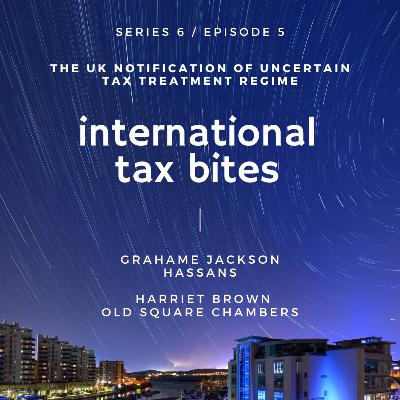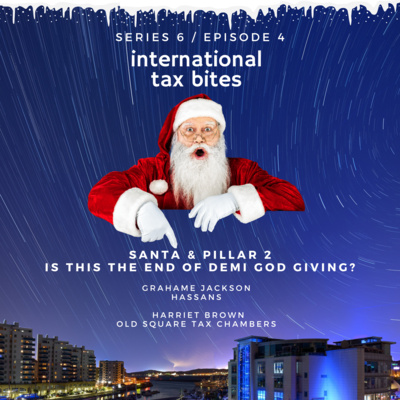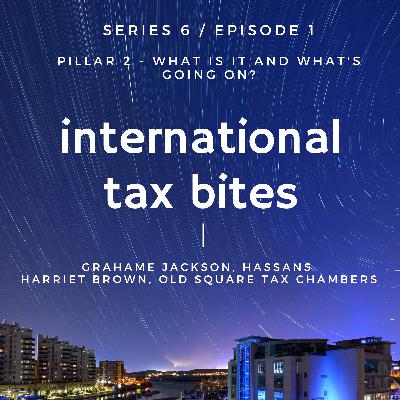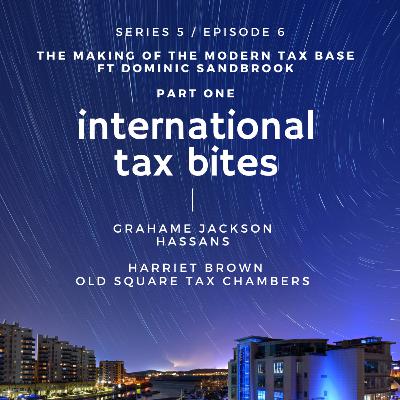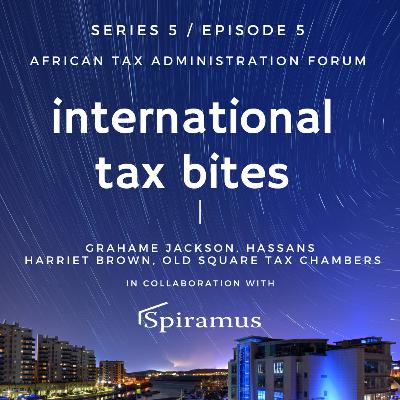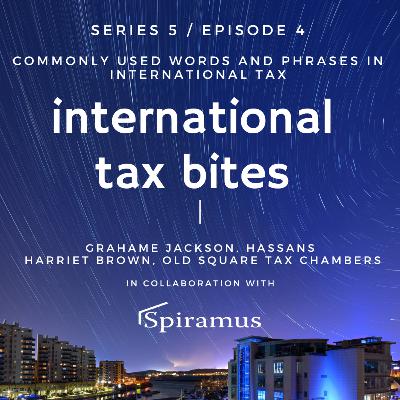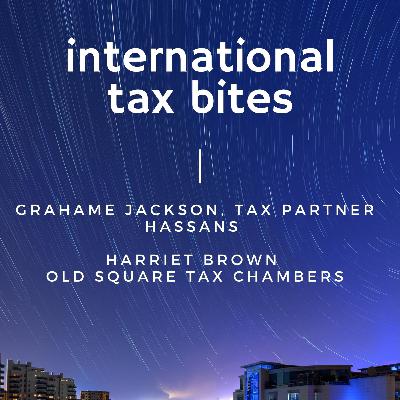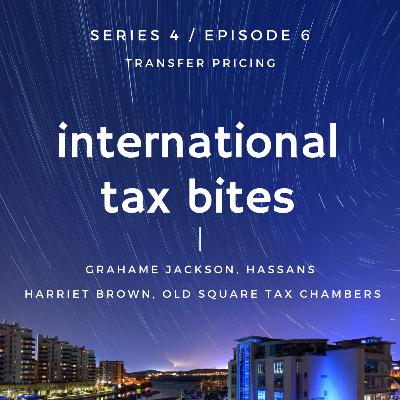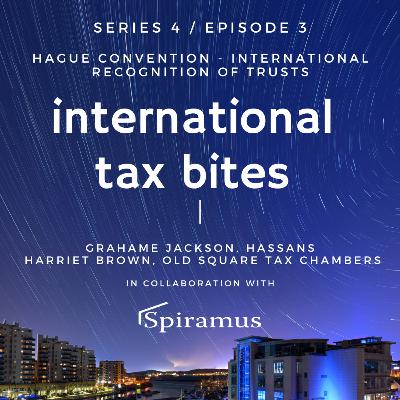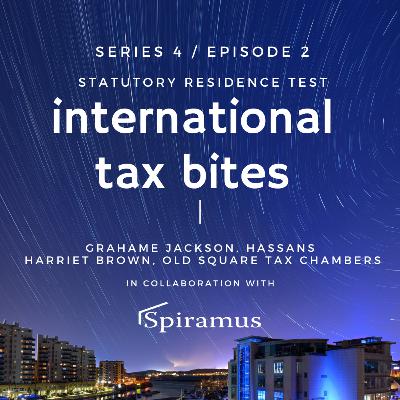Discover International Tax Bites
International Tax Bites

International Tax Bites
Author: Grahame Jackson and Harriet Brown
Subscribed: 42Played: 618Subscribe
Share
© Grahame Jackson and Harriet Brown
Description
International Tax Bites explores concepts and issues in international taxation. Welcome to a new podcast series by Hassans Partner Grahame Jackson and Harriet Brown of Old Square Tax Chambers...
Grahame and Harriet will discuss some of big concepts news and issues in International Taxation...
Contact: internationaltaxbites@gmail.com
Learn more about Grahame at https://www.gibraltarlaw.com/our-people/grahame-jackson/
Learn more about Harriet at https://www.taxchambers.com/team/harriet-brown/
Grahame and Harriet will discuss some of big concepts news and issues in International Taxation...
Contact: internationaltaxbites@gmail.com
Learn more about Grahame at https://www.gibraltarlaw.com/our-people/grahame-jackson/
Learn more about Harriet at https://www.taxchambers.com/team/harriet-brown/
101 Episodes
Reverse
In this episode, in the absence of Grahame, Harriet speaks to Susan Ball, President of the Chartered Institute of Taxation and RSM and, John Cullinane Public Policy Director of the CIOT https://www.tax.org.uk/about-us/spokespeople.
They discuss what the aims of the CIOT are, how it helps the profession and encourages education and continuing training amongst tax advisors. They touch on the qualifications the CIOT sponsors and its role in national and international policy making.
The UK Notification of Uncertain Tax Treatment Regime. In this episode Harriet and Grahame discuss the new Notification of Uncertain Tax Treatment Regime (or NUTT). They also muse on the status of guidance and the privileging of HMRC's position on disputed tax treatments. Happy New Year to all our listeners.
In this episode Harriet and Grahame discuss the impact of Pillar 2 (the OECD's global minimum tax rate proposal) . After explaining the basics of Pillar 2 they analyse whether Santa will be caught by the net of Pillar 2 and whether this will be a breach of international law surrounding Santa's special status under Article 4 of the Ho-Ho-Ho ECD's Multilateral Convention on Gift Giving Demi Gods.
Listen in for these and other terrible Christmas themed puns. And Harriet surprises Grahame with an on the spot quiz!
Merry Christmas everyone.
In this episode Harriet and Grahame discuss the EU Blacklist, and the 8th November 2022 changes to the backlisting criteria. The EU Code of Conduct Group and its black and greylists are the most effective international listing regime for taxation systems which are considered harmful by the EU. Inclusion on the blacklist can have quite severe economic and reputational consequences for some jurisdictions. Harriet and Grahame discuss whether the listing system is the most equitable approach and what if any weaknesses it may have in its current form.
In this episode Harriet returns to discuss with Grahame the Autumn Statement of 17th November 2022. In terms of tax what has the Chancellor done, how much will it raise and will it work?
In the absence of Harriet who was busy with her day job, Grahame spoke to Leonard Wagenaar, an expert on international tax developments over the last few years, about the continuing efforts to implement Pillar 2 or the Global Minimum Tax Rate.
They discussed in general terms what Pillar 2 is the effect of the Domestic Top Up Tax, Income Inclusion Rule and the Untaxed Payment Rule rules and how they interlock. They then went on to discuss the political manoeuvring around implementation; the problems the United States has in getting to the starting gate and the EU's internal difficulties with the various vetoes and the abandonment of the proposed directive.
In this episode Harriet and Grahame are joined by internationally renowned historian Dominic Sandbrook of the Rest is History podcast to discuss the making of the modern British tax base.
In part two they cover the period from mid 1960s to 1990 discussing the Great Inflation, the Winter of Discontent and the Thatcher Revolution along with the recent developments in UK, the impacts these events had on the tax policy and structure of the tax system of the UK, and finally does politics even really have an impact.
Dominic Sandbrook is a leading historian and author of a series of books on post-war Britain including Never Had it So Good, White Heat, Who Dares Wins and State of Emergency. He has made several TV Series for BBC (including “the 70s” and “the 80s with Dominic Sandbrook”). He is the co-presenter of the podcast The Rest is History with Tom Holland. He also writes for the Daily Mail, Sunday Times and has authored a highly successful series of children’s history books called “Adventures in Time”.
In this episode Harriet and Grahame are joined by internationally renowned historian Dominic Sandbrook of the Rest is History podcast to discuss the making of the modern British tax base.
In part one they cover the period from 1945 to the mid-1960s, discussing the birth of the welfare state, the socialisation of the economy under Labour, the post war consensus, and the impacts these events had on the tax policy and structure of the tax system of the UK.
Dominic Sandbrook is a leading historian and author of a series of books on post-war Britain including Never Had it So Good, White Heat, Who Dares Wins and State of Emergency. He has made several TV Series for BBC (including “the 70s” and “the 80s with Dominic Sandbrook”). He is the co-presenter of the podcast The Rest is History with Tom Holland. He also writes for the Daily Mail, Sunday Times and has authored a highly successful series of children’s history books called “Adventures in Time”.
In this episode Harriet and Grahame speak Professor Johann Hattingh of University of Cape Town. Using the famous tax case Duke of Westminster they discuss the development of tax law in English speaking Africa, in particular, Kenya, Tanzania, Nigeria and South Africa. They also look to the future with thoughts about the role of the UN, the OECD and the African Tax Administrators Forum (ATAF) and the demands being made on revenue authorities in Africa.
We are very proud to welcome such a well respected guest and have been very fortunate this series. You can learn more about Professor Hattingh here https://papers.ssrn.com/sol3/cf_dev/AbsByAuth.cfm?per_id=1779840
In this episode Harriet and Grahame discuss some of the more commonly phrases in International Tax such as "avoidance" "arm's length" "purpose" and "main purpose" amongst other things. They also discuss the correct location of the apostrophe in "arm's length".
In this the second episode of the Transfer of Assets Abroad Regime discussion Harriet and Grahame discuss the various types of motive defence available to taxpayers. They also compare TOAA to its related but very different capital gains tax charge s86 TCGA.
In this episode Harriet and Grahame tackle the Transfer of Assets Abroad regime which is one of the most effective tools in the anti-avoidance tool kit of the HMRC. They discuss the three charges to tax contained in TOAA, the definition of Associated Operations and the general principles underlying the regime. They will complete the topic in the upcoming Part 2 of the Transfer of Assets Abroad Regime.
The topic of discussion in this episode is the EU State Aid regime and its post Brexit descendant. Grahame and Harriet speak with Professor Philip Baker QC, unrivalled expert in all things tax. Professor Baker teaches at Oxford University and is a barrister with Field Court Tax Chambers. He is one of the most respected in his field globally.
The topic of discussion in this episode is the basics of transfer pricing, what are the transfer pricing rules for, what do they try and tackle and what are the approved methods of calculating transfer prices. This is a basic introduction to a very complex topic and we hope that we have tackled it well.
Most importantly in this episode Harriet and Grahame run a competition for listeners to win an International Tax Bites mug! the question is "What does 'OECD' stand for?" answers by email with your postal address to internationaltaxbites@gmail.com.
In this episode Harriet Brown and Grahame Jackson discuss the OECD's proposals to extend the Common Reporting Standard to cover Crypto assets and exchanges. The proposed rules can be found at https://www.oecd.org/tax/exchange-of-tax-information/public-consultation-document-crypto-asset-reporting-framework-and-amendments-to-the-common-reporting-standard.pdf
Harriet and Grahame discuss which entities will be in scope, what assets will be reportable, and what will be reported on the individuals involved, plus the timeline for implementation.
If you are operating a crypto exchange, or believe you will be obliged to report under the Crypto Asset Reporting Regime, feel free to contact us on harriet.brown@itbfiscalis.com or grahame.jackson@itbfiscalis.com.
In our 25th episode, Harriet Brown and Grahame Jackson spent their morning chatting with the brilliant Filippo Noseda from Mischon de Reya about the boundaries of automatic exchange of information and whether the balance between citizen and state have shifted too far in favour of the state.
In this episode, Harriet and Grahame talk through the Hague Convention related to the International Recognition of Trusts. Which country's laws apply to a trust can have tax consequences but it's generally important as well when trusts deal across borders and may well be subject to consideration by the courts.
In this episode Harriet and Grahame talk about the UK's statutory residence test. When it was introduced in 2013 the SRT was hailed as simplifying what was previously a minefield of uncertainty and a common law test. In fact it is one of the most complex residence tests Harriet and Grahame have ever come across.
In this episode Harriet and Grahame discuss the rules surrounding whether or not countries can recover tax debts through foreign courts. From the original rule in the Government of India case (Government of India v Taylor [1955] AC 491) known as the Revenue Rule through recent case law in SKAT (Skatteforvaltningen v Solo Capital Partners Llp [2022] EWCA Civ 234 (25 February 2022)) and discussing the EU and global agreements which mandate mutual assistance on taxing authorities, Harriet and Grahame discuss the development of cross border assistance in tax collection
In this episode Harriet and Grahame discuss the recent suspension by UK of its tax information exchange relationships with Russia under CRS and Country by Country reporting. They talk about what this could mean for financial institutions. Later on they consider whether the approach of seeking 100% global participation in CRS and other tax exchange regimes is correct especially as professionals may be mandated to collect information that will assist the collecting of tax by countries which behave in unacceptable ways.



